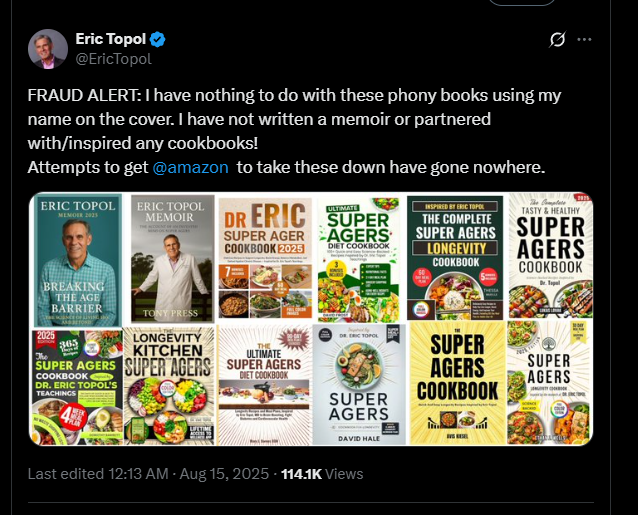Amazon is still struggling to stem the flood of AI-generated fake books

Update as of August 17, 2025:
Amazon told Sky News it enforces content guidelines using both automated and manual review. Books that break the rules—whether AI-generated or not—are removed. The company says it is constantly updating safeguards as AI evolves. Authors on Kindle Direct Publishing must disclose if AI was involved, but this information still isn't shared with customers, leaving a transparency gap.
Sky News reports cases like Topol's are widespread, especially in sports. After major events like the Women's European Championship, AI-generated mini-biographies with fake covers and scant content appeared. The supposed authors have no real online presence but push out dozens of books at once.
The Publishers Association is calling for clearer labeling of AI-generated content and warns buyers are getting confused. CEO Dan Conway says it's nearly impossible for readers to tell a well-researched book from one cranked out by AI, warning of "information saturation" as thousands of AI books crowd out genuine titles.
Original article from August 16, 2025:
Eric Topol warns that dozens of fake cookbooks and health guides misuse his identity on Amazon
Many AI companies claim that using copyrighted data for training is fair use since the resulting models are transformative and don't directly compete with the original works.
Scammers on Amazon, however, are far less subtle: they're selling books supposedly written by Eric Topol that are completely fabricated. Topol, a prominent doctor and scientist, has warned about dozens of cookbooks and health books being sold under his name and image without his consent.

Topol calls this outright fraud. He says he's reported these ISBNs multiple times without any result, and Amazon's customer service has only replied with generic links. One buyer shared that they purchased one of these books, trusting Topol's name, only to be let down by the content.
While AI-generated fake books are already a widespread issue on Amazon, the sheer number of titles misusing Topol's name shows just how much the problem has grown. The combination of tools like ChatGPT and easy self-publishing now makes it simple for scammers to flood the marketplace with AI-generated books that copy the style and branding of well-known figures.
Amazon has responded by limiting self-publishers to three books per day and requiring authors to report any use of AI-generated text, images, or translations, but this information isn't shared with customers. The company has also tightened rules for summaries and workbooks that often copy large portions of original works. Still, Topol's case shows that AI-generated fake books continue to slip through, hijacking the reputations of trusted experts.
AI-generated content is also produced on a large scale to generate advertising revenue. Fraudulent activities include fake celebrity endorsements and personalized phishing campaigns. Most misuse cases involve generating emotionally charged synthetic images or text on politically controversial topics and creating fake media.
AI News Without the Hype – Curated by Humans
As a THE DECODER subscriber, you get ad-free reading, our weekly AI newsletter, the exclusive "AI Radar" Frontier Report 6× per year, access to comments, and our complete archive.
Subscribe nowAI news without the hype
Curated by humans.
- Over 20 percent launch discount.
- Read without distractions – no Google ads.
- Access to comments and community discussions.
- Weekly AI newsletter.
- 6 times a year: “AI Radar” – deep dives on key AI topics.
- Up to 25 % off on KI Pro online events.
- Access to our full ten-year archive.
- Get the latest AI news from The Decoder.